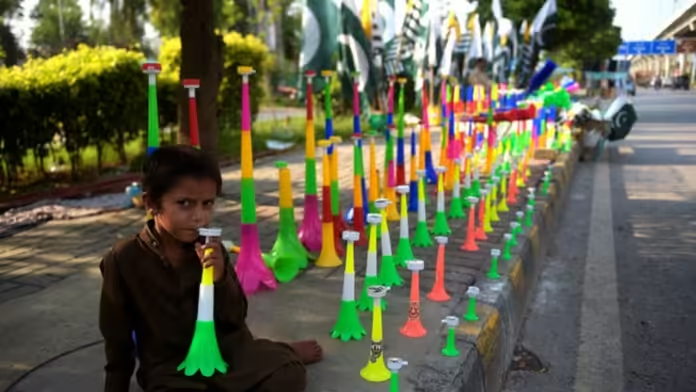A Quiet Step Towards a Peaceful Independence Day Celebrations – Strict Ban on ‘Baajas’ in Islamabad
With Pakistan’s 78th Independence Day around the corner, Islamabad’s lively streets are preparing for the customary chaos of green flags, patriotic ditties, and decorated vehicles. But this year, there will be one familiar noise absent from the celebrations the cacophonous hum of the ‘baaja.’
The Islamabad government has formally banned the sale and usage of these plastic horns, commonly referred to as vuvuzelas, in the federal capital. The move, declared by Deputy Commissioner Islamabad earlier this week, is intended to provide a calmer and family-friendly atmosphere during the national holiday.
Why the Ban?
For others, the baaja has been an Independence Day tradition, its cacophonous sounds ringing out late into the night. But for others, the piercing, incessant blast has been a nuisance harping on neighborhoods, disturbing the elderly, and even provoking hospital patients.
Officials have long been hearing complaints of noise pollution over the festive week. Similar prohibitions have been issued in the past, but the enforcement has not always been the same. This time, the government is getting tough, pledging daily checks and stiff fines for offenders.
Enforcement in Full Swing
Under the instruction of the Deputy Commissioner, all assistant commissioners and magistrates have been instructed to seize baajas being sold at roadside stalls or toy shops. Any officer caught being negligent in their duties will be held personally responsible.
Roadside sellers, usually a vibrant component of the pre-Independence Day rush, will be subject to removal of goods and potential legal action if found selling the prohibited horns. The crackdown is likely to gain momentum in the lead-up to August 14.
Balancing Celebration with Responsibility
Independence Day in Pakistan is an emotive event a reminder of the hardships, sacrifice, and togetherness that fashioned the country in 1947. The streets come alive with patriotic slogans, children wave flags from the rooftops of cars, and shops are full of green and white stuff.
But the government contends that celebrations need not be at the cost of public peace. The baaja ban, according to them, is not about taming the spirit of independence but making sure it is celebrated in a manner that beholds everyone from children and families to those who appreciate a less noisy commemoration.
Public Reaction—A Mixed Horn Blast
As with any restriction on tradition, the baaja ban has sparked debate. Many parents and residents welcome the decision, citing noise control and public comfort. “It’s impossible to sleep when kids keep blowing them late into the night,” says Ayesha Khan, a resident of G-11.
Conversely, others perceive it as the government ‘silencing’ the festivity. “It is only once a year. We look forward to this thrill,” reasons 18-year-old Bilal Ahmed, who remembers blowing his first baaja on August 14 as a kid.
A New Sound for Independence
Whether a person considers the baaja to be a festive noisemaker or an ear-piercing annoyance, its absence this year will definitely alter the soundscape of Islamabad’s celebrations. The avenues will continue to ring with patriotic songs, horns will continue to honk in concert, and laughter will continue to run through parks and neighborhoods only this time, perhaps, with a bit less shakiness in the air.
As the country sets out to celebrate yet another year of freedom, the Islamabad baaja ban provides a reminder that patriotism does not always have to be a loud affair and that, on occasion, silence is truly golden.
Visit Pakistan Updates for more news and updates.




